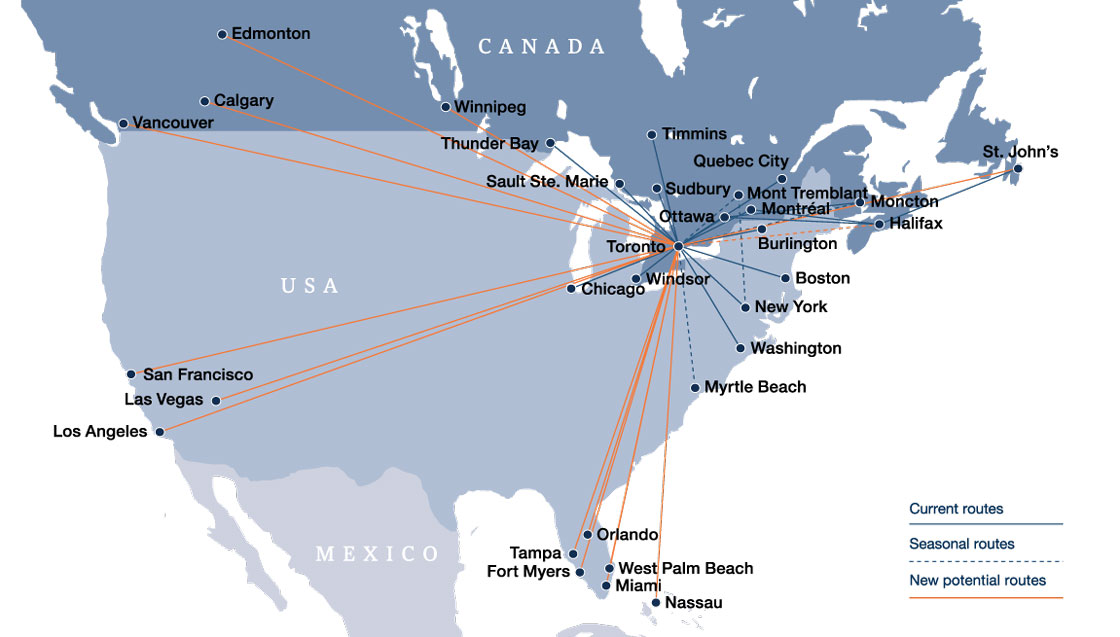TORONTO – An ambitious plan by Porter Airlines Inc. to dramatically expand its footprint across the continent is a high-stakes, multibillion-dollar gamble that may pay off the most for flyers.

But Porter faces hurdles including winning over a Toronto municipal government already voicing concerns.
“If we are able to proceed, significant destinations like Vancouver, Calgary, Miami and Los Angeles will open up to the benefit of everyone,” Robert Deluce, the upstart carrier’s chief executive said at a press conference in Toronto on Wednesday.
The proposal, if successful, means “more competition and more affordable airfares,” he said.
The plan will see the small airline boost the number of cities it flies to by as many as 14 new destinations beginning in 2016 (up from 19 now) in an attempt to muscle in on market share currently held by larger domestic airlines Air Canada and WestJet.
The move isn’t cheap with Porter announcing at the same time to spend upwards of $2.3 billion on new jets, specifically, up to 30 state-of-the-art C-series commercial aircraft from Canadian giant Bombardier Inc.
The planes are the latest from the Montreal company’s flagship series, touted on Wednesday as “whisper jets” ideal for carrying flyers in and out of urban airports surrounded by residential and commercial areas.
- Canadian man dies during Texas Ironman event. His widow wants answers as to why
- Several baby products have been recalled by Health Canada. Here’s the list
- Canadian food banks are on the brink: ‘This is not a sustainable situation’
- Invasive strep: ‘Don’t wait’ to seek care, N.S. woman warns on long road to recovery
Porter, which launched in 2006, flies out of Billy Bishop Toronto City Airport, which sits on the west end of Toronto Island in the city’s harbour. Deluce said the CS100 jets were the “ideal airplanes to take Porter Airlines and Toronto City airport into the future.”
“And it is made right here in Canada.”
The announcement was made the same day new data was released on airline tickets that showed rising prices among Canadian airliners.
The average price paid for a flight was up 2.8 per cent to $251.80 last spring – the latest data available by Statistics Canada, the government agency responsible for compiling the data.
The price didn’t include goods and services taxes, transportation taxes or user fees and surcharges, which typical inflate ticket prices substantially. The data was compiled using prices from Air Canada, WestJet and AirTransat, the country’s principal commercial airlines.
Porter’s expansion efforts are sure to put downward pressure on ticket prices and other fees, experts say.
Will the plan go through?
The small airliner’s plan however hinges on a new deal with various levels of government to amend terms of use at Billy Bishop Toronto City Airport, the nearly seven-year-old carrier’s sole operating hub.
Toronto’s city council as well as the federal government and Toronto Port Authority (which officially operates the island airport) must all agree to change conditions in the 30-year-old agreement to allow for jet access as well as extend the land strip by 168 metres at both ends.
In a clear message that the decision rests with the city, Toronto’s port authority said in a statement it “takes no position on Porter’s business aspirations.”
“The TPA will not consider any change of use to the airport until a determination is first made by the elected representatives on Toronto City Council regarding Porter’s proposed changes to the 1983 Tripartite Agreement,” the body said.
Some city councilors expressed reservations following the announcement.
Deluce made several attempts at the press conference to disarm the argument that the jets and general increase in activity in the skies above the city will pose a noise problem.
“The CS100 is a whisper jet that couldn’t even be envisioned when the agreement was signed 30 years ago,” he said.
The proposal also means 1,000 new jobs will be created, adding to the 1,400 people the company employs today.
“We do expect all three parties will support our plans,” Deluce said. “Especially when you consider the considerable economic benefits to the city of Toronto and the general flying public.”


Comments